Nigerian Military’s Recent Tactical Actions Spark Renewed Optimism For Safety
Nigeria faces numerous challenges, including violent crime, terrorism, and catastrophic flooding, yet civilians have expressed renewed faith in the military's efforts during these trying times.
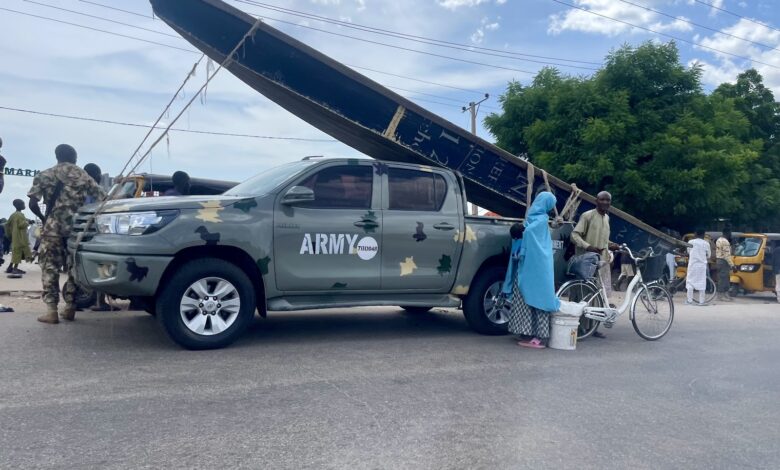
Residents of Maiduguri, the capital of Borno, northeastern Nigeria, have been through a roller coaster of emotions since the emergence of the Boko Haram insurgent group over a decade ago and other similar groups that have sprung up since. But the collapse of Alau Dam — the city’s main water source — has exacerbated the already dire humanitarian crisis gripping the state.
Over one million people have been affected by the flooding that occurred as a result of the collapse of the dam, which has suffered years of devastating decay despite the multimillion funds that have been disbursed for its rehabilitation. Aside from over 30 persons confirmed killed by the flooding, over 400,000 residents have been displaced, according to the National Emergency Management Agency (NEMA).
Though many residents remain missing as several communities are trapped in the flood, Nigerian security operatives have played a critical role in responding to the flood crisis by rescuing stranded residents, distributing relief materials, and providing medical aid following the directive of General Christopher Musa, the Chief of Defence Staff (CDS), that the Theater Commander of Operation Hadin Kai to provide immediate assistance to victims of the disaster.
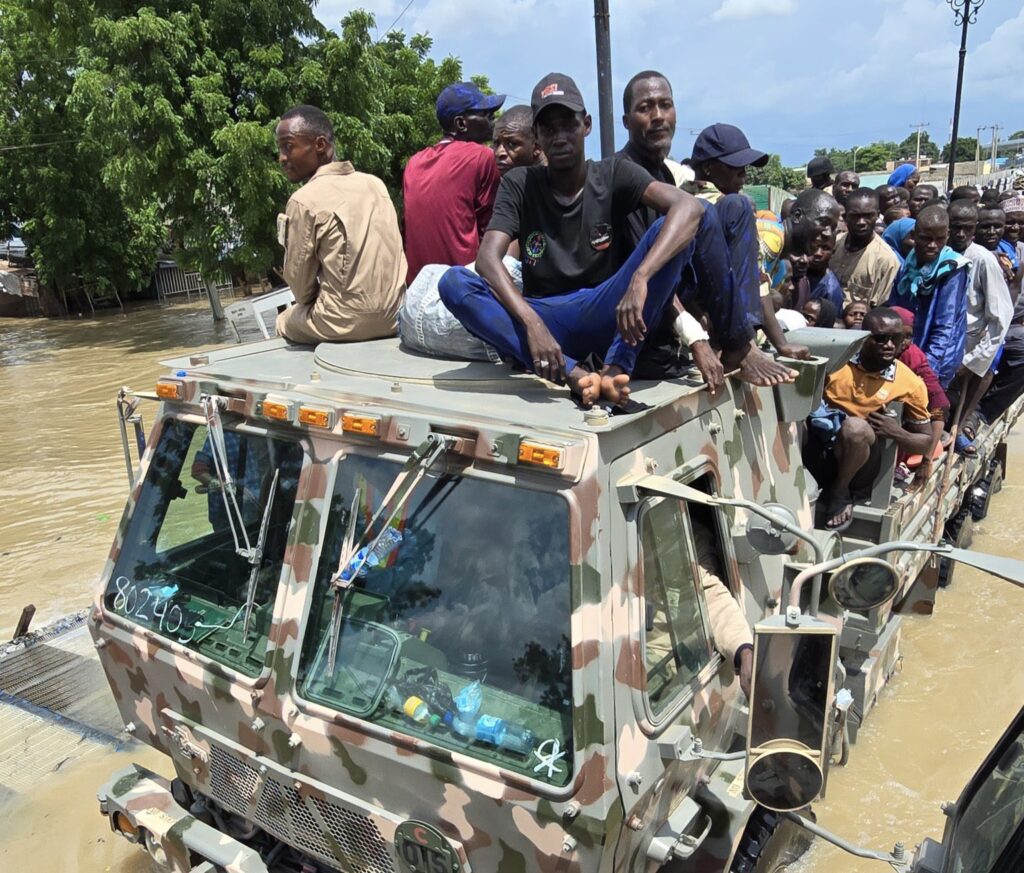
Along riverbanks like those in the Fori community, soldiers assist displaced residents in crossing the high-speed flowing rivers using speedboards. HumAngle also observed that troops protected properties to ensure that criminals did not take advantage of the disaster to loot flooded houses.
Abubakar Adam Zarma, a resident of Maiduguri whose relatives were rescued and supported by Nigerian soldiers, said the military efforts had significantly boosted the citizens’ confidence.

“I can categorically say that if not for the prompt involvement of the army in rescuing trapped victims, more casualties would have been recorded. Moving forward, the relationship between the people and the army will likely improve as trust has been established.”
On his part, Yahya Bulama, a victim of the flooding, said, “I felt happy when I heard the rescue mission soldiers were given to victims of flooding like me. It is a critical time that many people need help but could not get it. The soldiers have tried, and I am happy they are saving lives.”
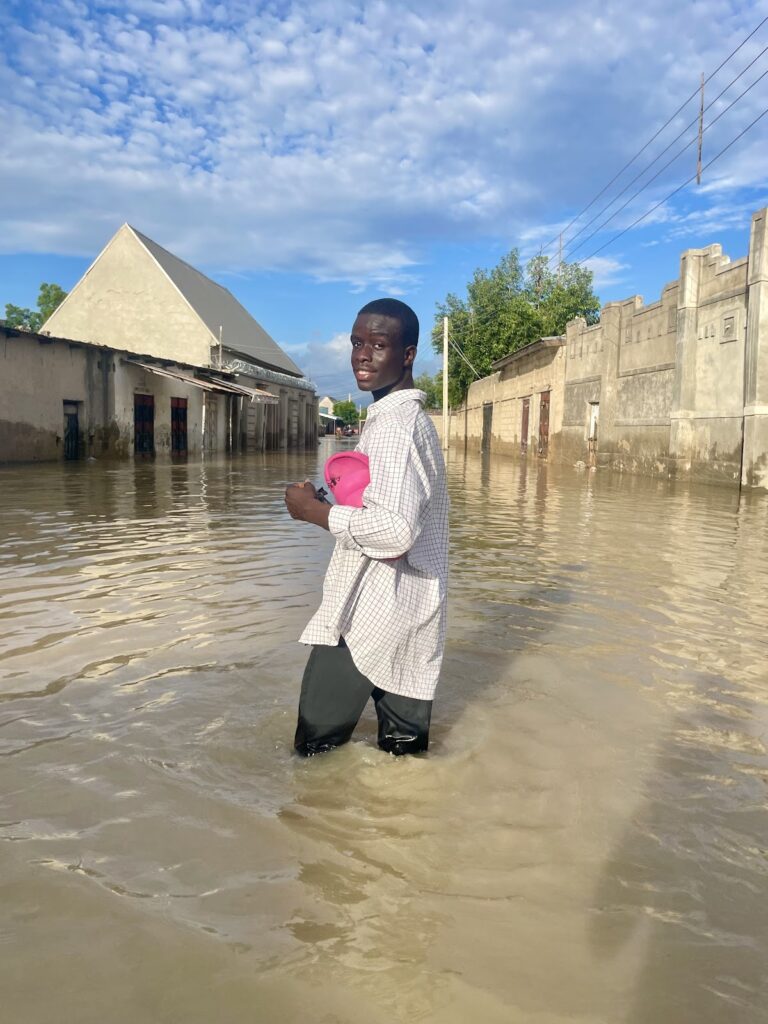
Interestingly, the military’s proactive measures have earned praise from many Nigerians, who have taken their appreciation to social media with the hashtags #ThankAsoldier. Manasseh Allen, an X user who replied to the army’s update on the microblog, posted saying, “We have seen all what your men are doing over the last few days, and it is commendable.”
In a similar post, Bajiddah Ajayi urged Nigerians to commend the military “for the lives saved, dexterity and bravery coupled with humane attributes displayed during the flooding crisis. They have reengaged my hopes, confidence, and trust. Welldone!”

Counterinsurgency in North West
The situation is not different in the North West, where local terrorists have held sway for close to a decade. The Nigerian military last week conducted multiple sweeping operations into the terrorists’ strongholds, leading to the killing of some notorious terrorist leaders who wield influence in rural communities across the region.
People like Halilu Sububu and some of his lieutenants drew their last breath in the hands of the men of Operation Hadarin Daji. Sububu ran a criminal enterprise whose attacks on security officers and civilians have led to the death of hundreds of people and displaced thousands more in communities like Maradun, Faru, Kaura Namoda, and Bakura, among others.
The notorious terrorist also controlled illegal mining sites around Sumke Forest in Anka, Zamfara state, which he used to fund his largely successful gunrunning business due to his close ties with the French-speaking jihadists in the Sahel, a region responsible for a large chunk of global terrorism deaths since 2021.
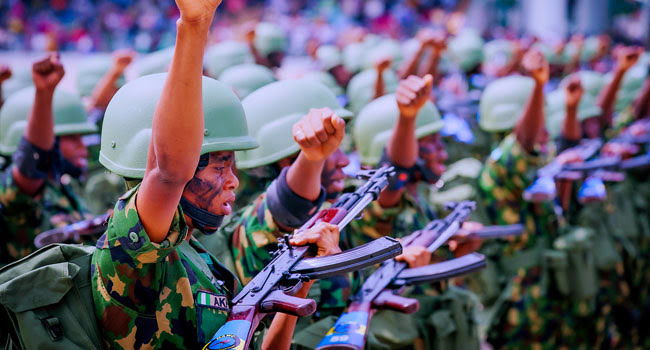
In Katsina, another terrorist – Sani Burki and his men, responsible for the spread of carnage around the Safana and the Batsari area of the state, were reported neutralised in a joint operation by the local vigilantes and men of the Katsina Community Watch Corps, a state-backed security outfit.
This falls on the heels of the marching orders given to the Defence Minister and the military chiefs to relocate to the region and contain the unbridled killings of rural villagers by the marauding terrorists.
Before this, the military has had difficulties navigating the tricky geography of the region amid insufficient troops, a situation the terrorists have exploited to unleash terror on rural communities where government presence is limited or nonexistent.
The heart of the conflict in the northwest — Zamfara — is straddled by forests that extend to states like Sokoto, Kebbi, Katsina, and Kaduna, some of which share national borders with countries like the Republic of Benin and the Niger Republic.
Reacting to the recent achievements of the military, analysts explained that authorities need a comprehensive strategy and cooperation with neighbouring countries to restore peace in the region. Last month, the Nigerian military chief visited Niger in what analysts agreed was a significant milestone towards boosting security cooperation in the region.
Many residents who spoke to HumAngle also commended the military for their thoroughness and resilience in the region but maintained there’s a need to intensify the fight.
“The current offensive is resulting in some positive outcomes, but it is still the lawnmower strategy. It is only designed to reduce the political pressure regarding banditry. In a few weeks or months, we will be back to reporting a massive number of raids,” said a Sokoto-based security analyst, who asked not to be named due to perceived security risks.
“The military needs to bridge the breakdown of intelligence sharing from the local level to the security hierarchy, and more private sector involvement is required to mitigate insecurity,” he added.
Meanwhile, some residents are concerned that the killings of top leaders of the gangs may be counterproductive without putting out the oxygen feeding the conflict.
“Security agents need to intensify the offensive to ensure that bandits fleeing their known camps are destabilised,” said a Zamfara resident who simply identified himself as Suraj. “For instance, I think they should destroy all camps belonging to Halilu Sububu in Anka and Maradun areas to stop his top boys from taking over his arms and continue committing atrocities.”
“We need to learn from previous mistakes because if the offensive stops now, the bandits may regroup and launch daring attacks on security formations and civilians. So, the operations should be sustained and expanded to Niger and Kaduna state.”
North-Central
Unlike other regions, the Northcentral seems to have a peculiar insecurity problem. Rural terrorists operate seamlessly, compounding the existing communal violence propelled by the thirst for land and mineral resources. Insurgency is also deepening its roots in the region, especially in Niger state, where Islamic extremists are now recruiting boys and forcing girls into marrying them. The security complexity of this region is partly geographical; most of the terrorised areas have proximity to states equally troubled with terrorism and insurgency, such as Kaduna, Sokoto, and Kebbi.
Consequently, the security forces fighting terrorists in this part of Nigeria have many fishes to fry. As insurgents detonated buried explosives to set ground soldiers off balance in Niger state, rural terrorists ambushed them on many occasions, making fights against terrorism a hard nut to crack.
However, recent offensive operations by the military have sent panic and terror into the bellies of armed criminals, distorting peace and order in this region. On Sept. 14, for instance, the Nigerian army chanted songs of victory on the internet after bombarding several terror camps, freeing captives, and wasting many terrorists, turning the Northcentral region into a vast killing field.
In a statement made available on its X page, the army said strategic operations against terrorism and insurgency had struck “a significant blow to terrorist networks, rescuing kidnapped students and seizing a large cache of weapons and ammunition.”
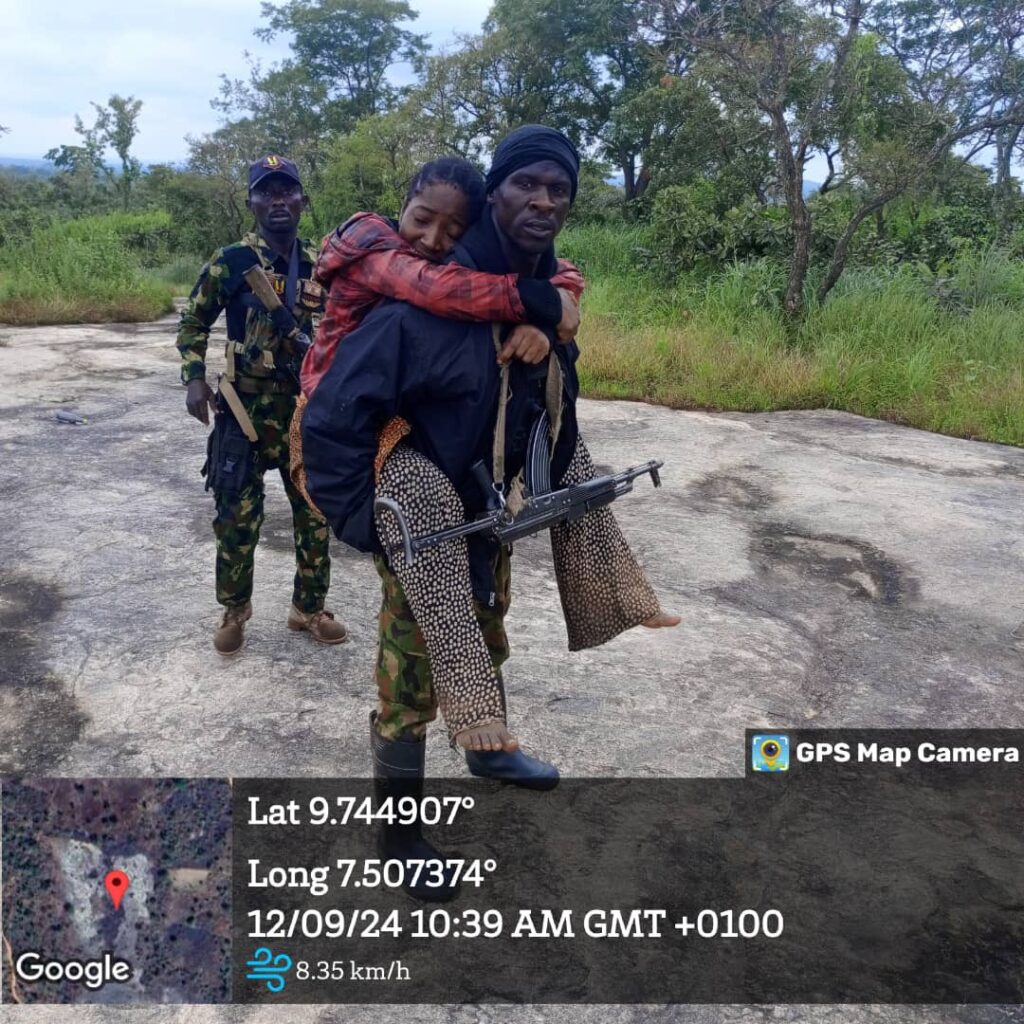
After gathering intelligence about the location of the terrorists, the military burst their hideout in a forest in Suleja, engaging them in a battle.
“The troops’ superior firepower led to the neutralisation of 3 terrorists, with 3 additional suspects—identified as Mallam Halalu, Mallam Suleiman, and Mr. Musa—captured alive. The suspects guided the troops to a concealed armoury, where 3 AK-47 rifles, 121 rounds of 7.62mm special ammunition, and ₦4,079,000.00 were recovered,” the statement partly read.
In the past week, about 28 terrorists were killed in Shiroro Local Government Area of Niger state during a seemingly coordinated air raid by the Air Component of Operation Whirl Punch.
“Nigerian Air Force (NAF,) air assets, on arrival, observed over 100 terrorists engaging friendly forces in a fierce firefight,” NAF noted in a statement. “After confirming the positions of friendly troops, the NAF conducted precision airstrikes on the terrorists’ positions. The strikes were devastating, neutralising dozens of terrorists in successive passes.”
Multiple sources, however, told HumAngle that the offensive operation was aided by on-site intelligence provided by operatives of the State Security Services (SSS), alongside some vigilante groups.
“They joined forces to take the battle to the doorstep of the terrorists,” said one of the sources who spoke anonymously due to security concerns. “The battle was more successful because of collaborative efforts from air and land soldiers and vigilante group members.”
Danjuma Muhammad, a security analyst based in the state, said the recent successful operations show the military’s commitment to ending terrorism and insurgency in the region.
“We can’t underrate the power of collaboration and get it right,” he said. “A typical example of what collaborative effort can do is the recent military offensive involving local vigilante groups and the SSS. This is what we lacked in the past, and I am happy it is happening now.”
Support Our Journalism
There are millions of ordinary people affected by conflict in Africa whose stories are missing in the mainstream media. HumAngle is determined to tell those challenging and under-reported stories, hoping that the people impacted by these conflicts will find the safety and security they deserve.
To ensure that we continue to provide public service coverage, we have a small favour to ask you. We want you to be part of our journalistic endeavour by contributing a token to us.
Your donation will further promote a robust, free, and independent media.
Donate HereStay Closer To The Stories That Matter




